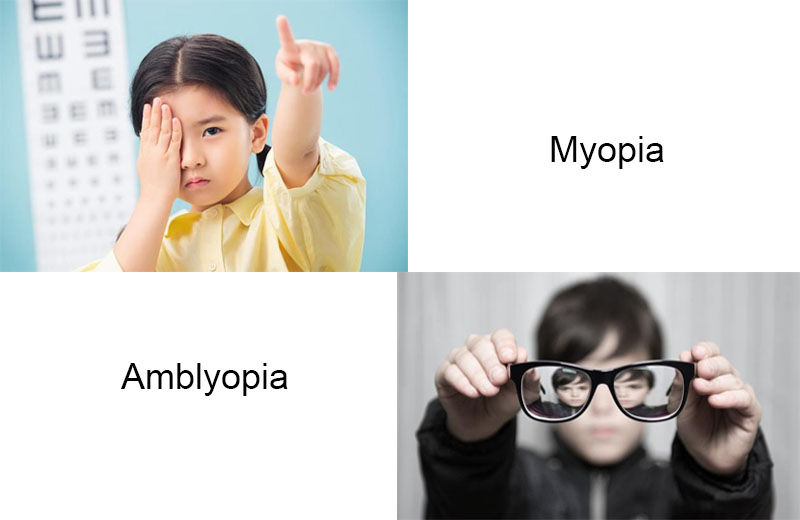
What is Amblyopia?
Amblyopia is the absence of organic diseases in the eyes with corrected visual acuity less than 0.9.Amblyopia is a common ocular disease in children in ophthalmology. It is a condition of decreased visual function due to various reasons such as perception, movement, conduction and visual center failure to accept appropriate visual stimulation, so that visual development is affected, mainly manifested as low vision and binocular monocular dysfunction.

1.)According to different causes:
1.Ametroic amblyopia:mostly bilateral, occurs in highly ametropica patients who have not worn corrective glasses. After wearing appropriate glasses, visual acuity can gradually improve, but it takes a long time, usually 2 to 3 years.So after the need to wear appropriate corrective glasses, vision gradually improved, visual training, faster recovery.
2.Strabismic amblyopia:Patients have strabismicamblyopia or have had strabismus before, and diplopia occurs due to eye deviation. In order to remove or overcome the diplopia caused by strabismus, the visual cortex center of the brain inhibits the visual impulses transmitted from strabismus, and the macular function of strabismus is suppressed for a long time, leading to amblyopia.Is secondary, functional, and therefore early appropriate treatment, amblyopia vision can be improved, but there are a few stubborn cases, although after long-term treatment, vision improvement is not much.
3.Anisometropic amblyuopia: Due to the large anisometropicamblyuopia between the two eyes, the images formed in the macula of the two eyes differ in definition or size, making fusion difficult. The cerebral cortex center can only suppress the images from the eyes with large amblyopia, and amblyopia occurs over time.It is possible to restore vision with treatment, and it can be prevented if corrected early, so it is reversible.
4.Formdeprivation amblyopia:In infancy, if corneal opacities, ptosis, congenital cataracts, or even improper eye covering, light cannot fully enter the eye, deprives the macula of the opportunity to receive normal light stimulation, and the development of visual function is inhibited, amblyopia occurs.This amblyopia, not only poor vision, and poor prognosis.
5.Congenital amblyopia :the pathogenesis of which is still not clear, may be due to small bleeding in the retina or optic pathway after birth, which may affect the normal development of visual function, some secondary to nystagmus, total color blindness, etc., such amblyopia has a poor prognosis.

2.)According to the nature of fixation, it can be divided into:Central fixation amblyopia and eccentric amblyopia
1.Central fixation amblyopia
Due to various reasons, the effective retinal stimulation of amblyopic eyes is insufficient, and the function of the macular area is inhibited, but the patient still takes the macular area as the focus of fixation. The focus of treatment is to eliminate the competitive inhibition of healthy eyes on amblyopic eyes, and restore the visual function of amblyopic eyes.
2. Eccentric amblyopia
The area outside the macula was selected to correspond to the macula area of the fixated eye when looking at the non-fixated eye simultaneously.Eccentric fixation is a monocular phenomenon, a monocular dysfunction due to deep inhibition of macula.The key to treatment is to change the eccentric gaze to the central gaze.
Thank you for watching
Mike Optical Company
017@mikeeyewear.com
Cayla
5.14.21